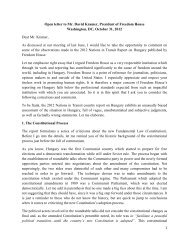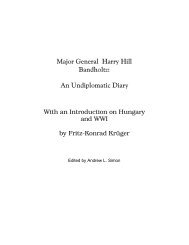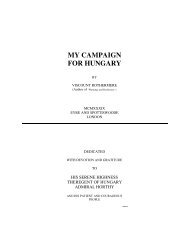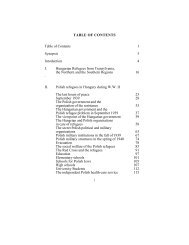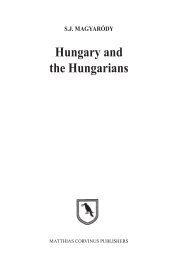The Fate of Western Hungary 1918-1921 - Corvinus Library ...
The Fate of Western Hungary 1918-1921 - Corvinus Library ...
The Fate of Western Hungary 1918-1921 - Corvinus Library ...
You also want an ePaper? Increase the reach of your titles
YUMPU automatically turns print PDFs into web optimized ePapers that Google loves.
populated border communities by the National Propaganda Commission<br />
increased, spreading the logic <strong>of</strong> staying with <strong>Hungary</strong>. Its Szentgotthárd <strong>of</strong>fice<br />
petitioned, on January 27, 1919, to ensure a supply <strong>of</strong> petroleum and a payment<br />
<strong>of</strong> 1,000 Kroner in an attempt to calm the German villages. 59 On top <strong>of</strong> all this,<br />
due to diminished public safety, robberies were frequent along the border, to<br />
the extent that armed gangs occasionally even confronted the police forces. It<br />
was for this that the border counties requested the strengthening <strong>of</strong> military<br />
units along the border. <strong>The</strong>se difficulties were not only used by German<br />
propaganda, but further stirred up opinions against the country.<br />
To address the situation, the Hungarian government publicized on January<br />
29 the law passed the previous day, 1919:VI, titled “On the practice <strong>of</strong> selfgovernment<br />
<strong>of</strong> the German people <strong>of</strong> <strong>Hungary</strong>.” 60 Among other things, the<br />
statute stated that, in areas where Germans formed the majority, “autonomous<br />
self-governing zones” may be created – with the agreement <strong>of</strong> other ethnics<br />
living there. <strong>The</strong> law, within appropriate limitations, ensured complete selfgoverning<br />
rights for the Germans in judicial matters, governing, internal<br />
administration, the law, religious matters, public education and culture. A<br />
German Ministry was created in Budapest, with local administrators who can<br />
choose the location <strong>of</strong> their administrative centers, their areas <strong>of</strong> responsibility<br />
further subdivided into districts. Probably because Germans were living<br />
dispersed in <strong>Hungary</strong> that the new statute did not specify where their selfadministrative<br />
areas were to be. This only came about during the time <strong>of</strong> the<br />
Hungarian Soviet Republic. In the days following the publication <strong>of</strong> the statute,<br />
on February 3, 1919, Mihály Károlyi, President <strong>of</strong> the Republic, 61 named János<br />
Junker, a judge on the Court <strong>of</strong> Appeals, as Minister responsible for German<br />
Affairs.<br />
Two weeks after the passage <strong>of</strong> the ‘German Ethnicity Law,’ on February<br />
14, the mayor <strong>of</strong> Sopron, Mihály Thurner, 62 also Government Commissioner,<br />
59 Kiss, Mária: Gazdasági-társadalmi és politikai viszonyok <strong>1918</strong> és 1945 között<br />
[Socio-economic and political matters between <strong>1918</strong> and 1945]. In: Szentgotthárd.<br />
Szerk/ed.: Kuntár, Lajos - Szabó, László. Szombathely, 1981, pp. 232–233.<br />
60 Collected statutes for 1919. Budapest, 1919, pp. 20–23; Bellér, Béla: Az<br />
ellenforradalom nemzetiségi politikájának kialakulása [<strong>The</strong> development <strong>of</strong> the ethnic<br />
policies <strong>of</strong> the counter-revolution]. Budapest, 1975, pp. 11–20.<br />
61 Károlyi earlier resigned his post as prime minister on January 11, 1919.<br />
Subsequently, Dénes Berinkey, the Minister <strong>of</strong> Justice, was named to the post on<br />
January 18, who also took the job <strong>of</strong> minister without a portfolio responsible for<br />
preparing the self-government <strong>of</strong> the minorities from Oszkár Jászi (1875-1957), who<br />
also resigned.<br />
62 Mihály Thurner (1878–1952) was born in Márcfalva (Sopron County), later annexed<br />
to Austria. In 1912, he assumed the job as head <strong>of</strong> Sopron’s audit <strong>of</strong>fice. During WWI,<br />
he was a soldier for a while but the city recalled him citing his indispensability.<br />
Between <strong>1918</strong> and 1945, he was mayor <strong>of</strong> Sopron. It was during this period he<br />
performed his duties as Sopronyi-Thurner. Of his career, see Turbuly, Éva: Adatok<br />
Thurner Mihály polgármester személyének és szerepének jobb megismeréséhez a két<br />
háború közötti Sopron életében. [Details <strong>of</strong> the person and role <strong>of</strong> Mayor Thurner in the<br />
30




